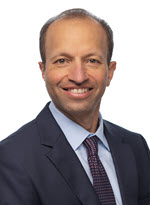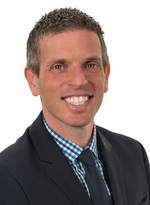Cardiac Rhythm Center
Creating an environment devoted to this purpose has enabled us to provide everything needed for the best patient outcomes in one place.
Our Team
The center enables leading cardiac electrophysiologists and cardiovascular surgeons to collaborate with a team of specially trained professionals, including a clinical nurse specialist, cardiac anesthesiologists, registered nurses, and technicians with special training in electrophysiology procedures.
Using state-of-the-art equipment, these professionals perform many procedures previously available only at leading academic medical centers. These include the most technologically advanced computer assisted diagnostic electrophysiology studies and catheter ablation procedures, as well as, the expert implantation of pacemakers, defibrillators and cardiac resynchronization devices.
Treating Disorders of the Heart's Electrical System
Normally, electricity flows throughout the heart in a regular, measured pattern. Problems can develop anywhere along the electrical pathways, disrupting the regular beating of the heart and causing an abnormal heart rhythm, or arrhythmia. Left untreated, arrhythmias can lead to serious consequences such as heart failure or sudden cardiac death, two leading causes of death in the U.S.
A comprehensive medical examination and special tests help cardiac electrophysiologists – cardiologists with advanced training in the diagnosis and treatment of arrhythmias – properly identify the rhythm problem. The treatment that best matches the individual needs of the patient can then be determined.
Atrial Fibrillation
The most common form of arrhythmia, atrial fibrillation, is an irregular heart rhythm originating in the upper chambers (atria) of the heart in which the heart’s electrical system causes the atria to quiver, or fibrillate. The quivering upsets the normal rhythm between the atria and the lower chambers (ventricles) of the heart, hindering the heart's ability to pump blood and depriving the body of oxygen and nutrients.
Full Range of Treatment Options for Arrhythmias
Ablation
- Radiofrequency (heat) Ablation is commonly used. It is a non-surgical procedure using small catheters in the heart to cauterize minute portions of the heart tissue that may be causing the arrhythmia.
- Cooled-tip Radiofrequency Ablation allows the use of higher power to produce larger and deeper lesions when needed for the elimination of certain arrhythmias.
- Cryoablation or freezing technology is a new ablation option that delivers extreme cold, rather than heat, to treat abnormal tissue. Cryoablation can further enhance the safety of ablation of some higher risk arrhythmias.
- Pulsed Field Ablation is a newer treatment available which doesn’t rely on using extreme temperatures for ablation. Instead of using very hot or cold temperatures, this method uses special electrical pulses to ablate heart tissue. These pulses only target the problem areas, which potentially limit damage to surrounding structures. Pulsed Field Ablation is safe, effective and efficient, allowing us to treat more patients, potentially reduce complications and deliver effective outcomes.
Hybrid Atrial Fibrillation (AF) Program

Our hybrid Atrial Fibrillation (AF) program is a newer development which combines minimally-invasive epicardial radiofrequency ablation (ablation on the outside of the heart) with endocardial cryoablation, done directly within the heart’s chambers.
This is used for patients who experience persistent AF following multiple previous ablations, or when the left atrium is severely enlarged. We feel this procedure is the most painless for our patients, with the shortest postoperative length of stay, and we are seeing a high success rate with our process.
The below computerized rendering of the left atrium shows atrial fibrillation originating from the pulmonary veins and extending into the posterior wall of the left atrium. Our new hybrid approach combines a surgical ablation of the posterior wall with endocardial ablation of the pulmonary veins.
Implantable Cardiac Defibrillator
An implantable cardiac defibrillator (ICD) uses electrical pulses or shocks to help control life-threatening arrhythmias, especially those that can cause sudden cardiac arrest. John Muir Health was one of the first Northern California hospitals to implant a completely subcutaneous ICD, with no electrical leads placed within the heart.
Laser Lead Extraction
Lead extraction is performed to remove pacemaker or ICD leads that are infected, malfunctioning, occluded or redundant. This procedure is performed as a heart team with an electrophysiologist and a cardiac surgeon working together in the procedure. An excimer laser is used to vaporize scar tissue that surrounds the problematic leads and allow its extraction.
Pacemaker Implantation
Pacemakers are implanted for a number of conditions including bradycardia, heart failure and syncope.
Left Atrial Appendage Occlusion
The Left Atrial Appendage Occlusion device is a new alternative to blood-thinning drugs in patients with atrial fibrillation. It is placed inside the left atrial appendage (LAA) of the heart to permanently close off this small pouch and keep harmful blood clots from entering the bloodstream. After the procedure, most patients are able to stop taking blood-thinning drugs. To learn more about Left Atrial Appendage Occlusion, click here.
Center Features
The Cardiac Rhythm Center features specialized equipment designed to assist physicians during complex electrophysiology studies. These include:
- Computerized heart monitoring systems that provide exceptional EKG recordings during electrophysiology studies and ablations. These systems reduce procedure times and enhance diagnostic capabilities.
- Two separate computer-assisted 3-D mapping systems which are used to locate and guide treatment of the most complex arrhythmias. Each system has unique capabilities that allow our electrophysiologists to select the best technology to diagnose and treat arrhythmias with greater accuracy and precision.
- Cardiac echocardiography that uses ultrasound technology to visualize the anatomy and physiology of the heart and measure blood flow from within the heart chambers. Images are transmitted via a steerable, ultrasound tipped catheter that is positioned inside the heart during certain procedures, such as ablation procedures for atrial fibrillation.
Our Location
Concord Medical Center
2540 East St., Concord, CA 94520
Cardiovascular Institute: (925) 674-2233
Meet Our Doctors
Anurag Gupta, M.D.
Cardiac Electrophysiologist
Carleton Nibley, M.D.
Cardiac Electrophysiologist
Christopher Swan, M.D.
Cardiac Electrophysiologist
SUDDEN CARDIAC ARREST AWARENESS
Watch this video from our very own Cardiac Electrophysiologist, Dr. Carleton Nibley, MD, as he speaks about the symptoms and treatment associated with sudden cardiac arrest awareness.


